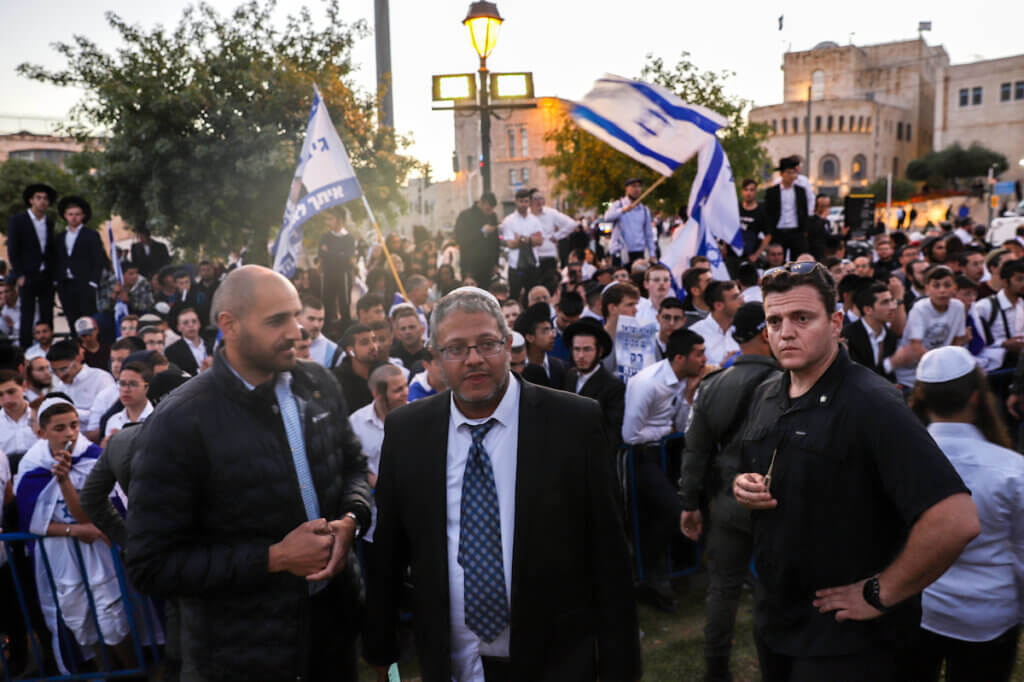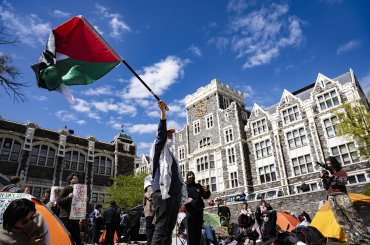Key Developments (June 23-26)

- Palestinian resistance groups in Jenin allegedly fired rockets toward Israeli settlements in the Jenin area on Monday, June 26. Videos posted on social media purport to show the “al-Ayyash Battalion,” affiliated with the Izz al-Din al-Qassam Brigades, the military wing of Hamas. Planted in front of the rocket launchers was a hand-written letter, which said, “The West Bank is the shield of Jerusalem, and the next is greater.” The Israeli army confirmed the rocket fire, saying one of the rockets failed to launch, and the second landed in an area of the West Bank under the control of the Palestinian Authority. “The rocket did not pose a threat to communities in the area,” the army said in a statement, seemingly referring to the illegal Jewish settlement community. The army added that it was searching for “suspects” involved in the rocket launch.
- A Palestinian child lost one of his eyes after he was struck in the face by an Israeli rubber-coated steel bullet on Friday, June 23, in the Nablus-area village of Bizzariyya. The young boy, reported to be 5 years old, was reportedly in his father’s car when the bullet struck him in the eye. The incident took place during confrontations near the entrance to the village, during which Israeli soldiers “heavily fired” towards Palestinian residents, Wafa news agency reported.
- In the village of Deir Dibwan, one Palestinian was injured with live fire and dozens of others suffered tear gas inhalation on Friday, June 23, when Israeli forces shot towards Palestinians in the town who were fending off a settler attack. Israeli settlers were reportedly attempting to launch an attack on the town, similar to the attacks carried out earlier in the week. According to Wafa, “army-backed settlers” attempted to raid the town and set fire to the homes in the area, but were fended off by local youth. Israeli forces shot live ammunition and tear gas towards the Palestinians. Wafa added that Israeli settlers also congregated near the village of Beitin, on the outskirts of Ramallah city, and threw rocks at passing Palestinian vehicles. Similar incidents were also recorded in the Hebron area.
- Violent settler attacks in the West Bank continued on Saturday, June 24, with shocking video recorded of groups of heavily armed settlers firing at Palestinians in the village of Umm Safa near Ramallah. According to reports, the settlers targeted local residents, ambulances, and journalists who were reporting at the scene. Dozens of settlers attacked the village, reportedly under the protection of Israeli forces, setting fire to Palestinian homes and property, and shooting indiscriminately towards Palestinians. The settlers also threw rocks towards a Palestinian ambulance that was evacuating an injured person, resulting in the injury of the ambulance driver as well. Human rights activists with B’Tselem wrote on Twitter that some members of the settler militia who attacked Umm Safa “appear to be off-duty soldiers.” Settlers were also documented setting fire to farmlands in the Hebron-area village of Sa’ir. Attacks were also reported in the Nablus-area village of Urif, which is located near the notoriously violent Yitzhar settlement, and near the Ein Eyyub junction near Ramallah, where one Palestinian was injured after settlers attacked his car with rocks.
- Two Palestinians were killed on Saturday, June 24, in the West Bank. One Palestinian, identified as Tareq Mousa Idris, 39, was shot in the abdomen by Israeli forces during a raid on Nablus on Friday the 23rd and succumbed to his wounds the next day. On Saturday, 17-year-old Ishaq Hamdi Ajlouni was shot by Israeli forces and was reportedly left to “bleed to death,” after he allegedly attempted to carry out a shooting operation at the Qalandiya military checkpoint separating East Jerusalem from Ramallah. Ajlouni was a resident of the town of Kufr Aqab, which is located within the Jerusalem municipality but lies on the West Bank side of the Israeli Separation Wall.
- At least fifteen Palestinians, including six minors, were detained between Friday and Monday by Israeli forces during raids in several areas across the West Bank. Several injuries, including live ammunition and tear gas inhalation, were also reported during the raids. Israeli army raids into Palestinian towns and villages are a near-nightly occurrence. There are currently 5,000 Palestinians in Israeli prison, including 160 children.
In-Depth
The events of the past two weeks have deepened the rift between Israel’s military-security establishment and the rising settler bloc, represented by Netanyahu’s hardline coalition government and spearheaded by the likes of National Security Minister Itamar Ben-Gvir and Finance Minister Bezalel Smotrich. This rift was first set off by the right-wing judicial overhaul, and was actualized by conferring new and unprecedented powers to the rightwing settler bloc over the West Bank.
This included, most crucially, the transfer of powers to both Ben-Gvir and Smotrich. Smotrich was granted control over the Civil Administration (the body responsible for governing Palestinian civil affairs in the West Bank alongside the Palestinian Authority), which most recently bore fruit with the approval of the construction 4,560 new settlement units in the West Bank; and Ben-Gvir was granted control over the Israeli Border Police, paving the way for the formation of his promised “private militia” or “national guard,” which would be composed of an armed civilian force.
This rift was first set off by the right-wing judicial overhaul, and was actualized by conferring new and unprecedented powers to the rightwing settler bloc over the West Bank.
The Israeli security and military establishment has sounded the alarm, regarding these developments as drastic structural changes that promise to upset the prevailing status quo in the West Bank and the decades-old approach to colonial rule that the Israeli army Central Command has cultivated since 1967.
Just last week, these competing Zionist approaches to colonial rule came to a head during the fallout from the settler pogroms in Turmus Ayya, Orif, Lubban al-Gharbiya, and Huwwara. Top Israeli military officials and chiefs of staff, in addition to top officials in the Shabak, Israel’s intelligence services, vowed a “crackdown” on vigilante settler groups. The response from the right was apoplectic.
Smotrich decried the army chiefs’ characterizations of the settler pogroms as “nationalist terrorism,” stating that “the attempt to equate murderous Arab terrorism with civilian counter actions, as serious as they are, is immoral and dangerous” (emphasis added). Another minister in Netanyahu’s government, Orit Strock, likened the security chiefs to the mutinous Russian “Wagner Group.”
But in turn, the Israeli military and intelligence establishment considers these hardliners to pose a long-term threat to Israeli national security. This can be gleaned in extensive detail in a recent report put out by the Institute for National Security Studies (INSS), Israel’s premier military-intelligence think tank. The report argues that the policies of the current Israeli government in the West Bank threaten to upend the Israeli army Central Command’s “carrot and stick” policy — alternating between “military power” and “soft power” as a long-term counterinsurgency strategy — while the current hardline government would make much more liberal use of the “stick” and perhaps do away with the carrot entirely. For the report’s authors, which includes a former top Israeli general, the government’s policies are “liable to create a security disaster for the State of Israel, along with serious political challenges.”
But there is one issue around which even these competing viewpoints might agree — namely, on what to do about Jenin and the recently increased capabilities of the armed resistance in Jenin refugee camp. Ever since the Israeli army launched two botched invasions of Nablus and Jenin in recent weeks — in Nablus, Israeli forces didn’t capture their target, and in Jenin, the invasion became a protracted firefight after a troop carrier was taken out by a Palestinian IED and Israeli ground forces needed a combat helicopter to bail them out — increasing demands have arisen from both the right and the military-security establishment in calling for an “Operation Defensive Shield 2.”
These demands were first put forward by Ben-Gvir back in February, but at the time he was mocked at the assertion and labeled a hardline extremist — as opposed to the supposedly “level-headed” approach of the military-security establishment. The latter camp has remained relatively resolute in its line that a large-scale reoccupation of the West Bank, or even parts of the West Bank, remains an undesirable and daunting prospect, especially for the military, which fears becoming embroiled in a protracted and complicated fight in Jenin.
But we can already notice cracks in the consensus, as the Israeli Shabak has expressed concern at the growing military capabilities in Jenin, and even a senior researcher at the INSS has expressed support for a reoccupation of the Jenin governorate in order to take out the “terrorist infrastructure” in light of what he views as the “Lebanonization” of Jenin. The author believes that the achievements of the armed resistance in withstanding a “larger and stronger” Israeli force while succeeding in “inflicting damage and casualties on the Israeli side” might boost Palestinian morale and inspire more resistance.
The proposed solution is to lay siege to Jenin and launch a massive military campaign:
“A broad military operation in the Jenin area should be prepared, while encircling and completely isolating it for a limited period of time and entering the area with a large and significant military force for the purpose of dismantling the terrorist infrastructure there and preparing the conditions for the return of the Palestinian Authority to more effective control. The military move must be significant and its results unequivocal, both to neutralize the terrorist infrastructure in the area and to produce the required psychological effect.”
In other words, restoring Israeli deterrence through the venerated liberal Zionist tradition of terrorizing the natives into submission. All of these variations in Zionist thinking and colonial strategy, no matter their internal tensions, ultimately return to the genocidal option when faced with the reality of native resistance. In this respect, distinctions between hardliners and doves start to mean very little, but the real differences lie in the opportunities for accelerating anticolonial resistance that the rule of the hardliners might create.
Important figures
- 180 Palestinians have been killed in the West Bank, Gaza and East Jerusalem since the start of the year, according to the Palestinian Ministry of Health
- 85 settler attacks against Palestinians and their property were recorded in the West Bank last week



“the Israeli military and intelligence establishment considers these hardliners to pose a long-term threat to Israeli national security.”
____________________________________________________
These hardliners also pose a threat to greater Israel’s sway over the US political system. An opportunity seemingly not being noticed by those who stand to benefit the most.
https://www.al-monitor.com/originals/2023/06/us-delivers-tough-talk-israeli-officials-over-west-bank-escalation
Secretary of State Antony Blinken just (Wednesday June 28th) said on Morning Joe that the situation between Russia and Ukraine “is black and white..you have an aggressor and you have a victim” I would have immediately stated in response to Blinken’s lop sided comment “that statement would also apply to the U.S. in regard to the Bush administrations unnecessary, immoral “unprevoked” invasion of Iraq.” That statement would/should also apply to Israel’s persistent aggression and illegal actions/occupation of Palestine. Putin, the U.S. (Vietnam, Iraq,Afghanistan etc) Netanyahu etc have all committed serious and inexcusable crimes against humanity.
Blinken would, dodge, weave and make excuses for U.S. and Israel’s war crimes. He would essentially lie if confronted with the accurate comparison.